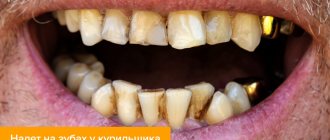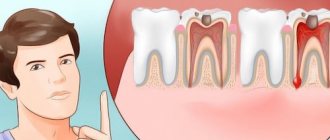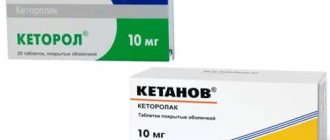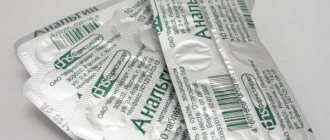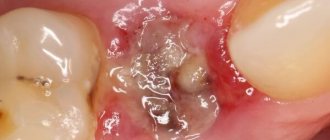Destruction of the tissues that form the crown and root parts of the tooth invariably leads to discomfort, and in more advanced cases – to acute, throbbing or nagging pain. In dentistry, toothache has a special definition – dentalgia or odontalgia. Often the cause of pain can be gum disease, jaw problems, or injuries. Unfortunately, it is not always possible to get an appointment with a dentist at the first signs of discomfort, so you can use tablets for toothache to relieve symptoms and improve your well-being.
It is important to understand that not a single tablet can eliminate the cause of toothache. The only way to cope with dentalgia for a long time is to consult a dentist for therapeutic or surgical treatment.
The choice of a particular treatment method depends on the complexity of the problem and the stage of its development.
By clicking the “request a call” button you agree to the personal data processing policy.
Modern pharmacology offers a wide range of effective drugs that can reduce discomfort caused by progressive dental diseases or injuries. Today, you can buy a variety of medications for toothache in pharmacies. Conventionally, they can be divided into 3 groups:
- NSAIDs (non-steroidal anti-inflammatory drugs)
. As a rule, the source of toothache is an inflammatory process. NSAIDs don't just relieve pain - they relieve inflammation, thereby reducing pain. - Analgesics.
They do not affect the course of the inflammatory process - they eliminate the source of pain by affecting the nerve endings and pain centers in the brain. - Local painkillers
. These are drugs such as lidocaine and novocaine. As a rule, these products are produced in the form of injections, but you can find small aerosol cans with lidocaine on sale - one press and the pain goes away for 30-40 minutes. The main disadvantage of local anesthetics is their strong effect on nearby tissues, which can result in a “cotton tongue” effect, temporary loss of skin sensitivity at the site of exposure, and lack of taste sensations.
As a rule, tablets are the most popular - they are easy to use, and if you choose the right drug, you can use them not only to relieve toothache, but also as an antipyretic, a medicine for migraines, joint pain, etc.
Other medications for toothache
In addition to tablets and capsules, the pharmaceutical industry offers a lot of other drug options that help in the fight against dentalgia:
- Gels.
They are most often used in children during teething. Moreover, such remedies also have an effect in adults during the eruption of wisdom teeth. Among the most popular drugs of this kind are ointments and gels “Cholisal”, “Solcoseryl”, “Dentol”, “Kamistad”, “Metrogil Denta”. - Dental drops.
These are safe, natural preparations made on the basis of natural ingredients, extracts, and essential oils. They have a local anti-inflammatory, calming and analgesic effect. Popular drops - “Dentaguttal”, “Dentinox”, “Dantinorm”, “Denta” - Injections.
These may be conventional drugs for intramuscular administration (Ketonal, Ketorol, Diclofenac), or they may be drugs for point application. Most often, injections are used by professionals for strong pain relief before tooth extraction or treatment (Ultracain, Septodont). - Antibiotics.
It is important to understand here that if a tooth hurts due to the development of caries or pulpitis, then antibiotics are useless (after all, they do not have any effect on the exposed nerve). But if there is a suspicion of the formation of an abscess under the root (obvious inflammation), then it makes sense to take a course of antibiotics (amoxicillin, clindomycin, metronidazole, chloramphenicol, biseptol) for maximum resorption of the accumulated pus. Of course, immediately after this you need to go to your doctor and eliminate the root cause of the pain (treat or remove the tooth). Antibiotics are available in the form of tablets, ointments, and injections. - Sprays and aerosols.
These medications have a local anesthetic effect; simply put, they freeze the tooth. The most popular is Ledocaine spray.
Folk remedies:
- Rinses
Most often, a saline or soda solution is used (1 teaspoon per glass of water), to which you can add a couple of drops of iodine. You can rinse a sore tooth when the first pain appears. - A decoction of sage, chamomile, and St. John's wort for rinsing is also recommended. It is quite simple to prepare: pour boiling water over 1 teaspoon of any of the above herbs, hold in a water bath for 15-20 minutes, strain and cool slightly. Rinsing is carried out as needed to relieve pain with a warm decoction.
- Cooling
. For local anesthesia, you can temporarily apply a piece of ice or something cold to the painful tooth (or rather, to the cheek on the painful side). As a rule, the effect occurs quickly, but does not last long. The main disadvantage of this method is that after applying ice, the pain may disappear for a while, and then return with renewed vigor. - Garlic applications
. Oddly enough, you need to apply garlic not to the tooth, but to the hand (in the place where the pulse is usually felt). The garlic is cut into small cubes or pressed through the garlic, a piece of bandage is placed on the wrist (if this is not done, there is a high risk of a chemical burn from contact of garlic juice with the skin), folded in half or three times, garlic is laid on the bandage, covered with two or three layers of bandage on top. and secure the application. If you have a toothache on the right side, then apply the garlic to your left hand and vice versa.
You can find even more traditional methods in this article.
When a person starts to have a toothache, he is ready to use any means to make it end as soon as possible. Some patients, in the fight against dentalgia, use homeopathic remedies, which, in theory, are designed to cope with the disease. In fact, this makes very little sense: toothache is not a disease, but a symptom of it that needs to be quickly relieved. Homeopathic medicines are intended for long-term treatment, so instead of wasting time and money on useless medicines, it is better to take a tablet of a good painkiller and see a dentist as soon as possible.
Can pulpitis go away on its own?
Pulpitis is a pathological process that develops in the so-called pulp chamber, where all the nerve endings and vessels feeding the tooth are concentrated. Most often it occurs as a complication of caries, when the cavity extends deep into the tissue. But a traumatic nature is also possible, for example, in the event of a fracture or severe bruise of a tooth, or careless medical intervention that results in overheating of the pulp or opening of its chamber. Pulpitis develops extremely rarely against the background of only general somatic pathologies.
What are the symptoms?
A typical sign of the disease is aching pain. At first, it makes itself felt only when exposed to temperature stimuli, when we eat something very hot or, on the contrary, cold. As the pathology develops, the pain syndrome practically does not leave the patient, disturbing him even at night, which significantly reduces his quality of life. The pain becomes simply unbearable; due to the spread along the entire branch of the trigeminal nerve, it radiates to the temporal and ear regions.
What if the pain went away?
But what if the patient suppressed this pain for a long time with strong analgesics and finally it went away? Elimination of the main symptom contributes to the formation of the erroneous opinion that pulpitis can go away on its own. In fact, this is of course a common misconception! Temporary subsidence of pain only indicates the transition of the disease from an acute to a chronic stage. Unfortunately, it is the meager symptoms of chronic pulpitis that are one of the main reasons for late visits to the doctor and the development of complications:
- periodontitis
(an inflammatory process that begins in periodontal tissues), which is manifested by sharp pain concentrated on the affected side; upon transition to the stage of purulent inflammation, the pain becomes throbbing, purulent exudate is separated, collagen fibers are gradually destroyed, which is accompanied by severe swelling, increased body temperature and a deterioration in the patient’s general well-being; - tooth loss
- occurs as a result of the destruction of the periodontal ligaments, which are responsible for holding the tooth in the alveolus; - periostitis
(inflammation of the periosteum) with the formation of flux, characterized by severe pain and swelling (swelling of the gums and cheek), develops as a complication of periodontitis or in parallel with it; in the absence of proper treatment, a fistula tract occurs, through which purulent masses come out, after which short-term relief occurs, but the infection in the tissues persists and continues to spread; - periodontitis
(inflammation of the periodontium) is dangerous due to the gradual recession (loss) of the gums, resulting in adentia (loss of a tooth - one or several at once); - systemic diseases
(blood poisoning, phlegmon, etc.) are serious complications and occur against the background of long-term infection of the soft tissues of the face.
To avoid this, you should not wait for pulpitis to go away on its own. Toothache cannot be tolerated! It is the first signal that something is wrong. Therefore, it is important to visit the dentist on time in order to diagnose and treat the disease in the initial stages, before life-threatening complications arise.
Read more:
- Fear of the dentist
- Why does a dentist need a microscope?
What to do if the pills don't help?
It often happens that even after taking strong painkillers, toothache does not subside. This happens for many reasons: advanced caries, pulpitis, severe destruction of the crown, abscess on the root (by the way, practice shows that in this case even local anesthetic injections such as Ultracaine are ineffective). In addition, do not forget about individuality - there are people who are simply not susceptible to the effects of drugs. Also, drugs that affect the nervous system and brain pain centers may not be effective in patients who are in a constant state of stress.
If no pharmaceuticals or folk remedies help, you should not look for a magic pill - you must urgently go to a dental clinic for qualified help.
Non-dental reasons
The doctor’s task when treating a patient with pain is to establish that it was dental problems that caused the deterioration in health. For this purpose, the specialist conducts differential diagnostics. The doctor compares and then excludes other diseases that manifest symptoms similar to dentalgia.
The specialist will have to make sure that there are no pathologies of the neurological, cardiovascular system, or ENT organs. These diseases include:
- Neuralgia . The trigeminal nerve is present in the human body. The structure provides sensitivity to the face and oral cavity. With inflammatory damage to the trigeminal nerve, the patient experiences intense pain. Clinical manifestations are complemented by irritability, swelling of the cheeks, and lacrimation. Standard analgesics are practically ineffective, and when they reduce discomfort, the result does not last long. Inflammation of the trigeminal nerve is treated by a neurologist. An experienced dentist is able to immediately determine that the disease does not apply to his profile.
- Migraine . The headache is characterized by unilateral localization. The patient's general well-being worsens from loud sounds and bright lights. The location of pain can migrate - cover the temporal, parietal region. Debilitating discomfort spreads to the orbit and frontal part. When the condition is left untreated for a long time, standard analgesics do not have the expected effect. Then the intensity increases, and the patient mistakenly perceives the headache as a toothache.
- Otitis. Inflammation of the ear canal most often occurs in children, but also occurs among adults. Clinical manifestations of the disease are hearing loss, throbbing pain on one side of the head. An unpleasant sensation spreads to the lower jaw.
- Violation of the functional ability of the heart (angina pectoris, myocardial infarction). Pain syndrome is predominant in this case. An unpleasant (burning, pulsating) sensation spreads to the left shoulder blade, shoulder, and lower jaw. If the heart rhythm is disturbed, the patient notes pain in the lower jaw. This becomes a reason to suspect problems with the condition of the teeth. In the process of performing diagnostics, the doctor focuses on the clinical picture and examination results. To determine the cause of dentalgia, a person seeking help will have to undergo several diagnostic procedures.
How often can you take painkillers?
Whatever the cause of toothache, you should never abuse painkillers:
There is no universal recipe for taking painkillers for toothache. Each drug is accompanied by instructions that clearly describe the dosage and method of use depending on the nature of the pain, age, weight of the patient, etc.
If we summarize all the recommendations, we can say that taking more than 3-4 tablets a day is not recommended (while strong tablets, such as Nise or Ketanov, it is generally better to take no more than 2 times a day).
Weaker drugs can be taken in larger dosages (1-2 tablets at a time, 3-4 times a day). But, again, if the pain is severe and you have to swallow 8 Paracetamol tablets to cope with it, it is better to take 1-2 tablets of Aertal or Nurofen - the effect will be approximately the same.
What to do if only cold water helps with pain
At a certain stage of the disease (in particular, with gangrenous pulpitis), rinsing with cold water can help. Please note, under no circumstances is it icy. Rather, we are talking about water at room temperature, which is perceived by our body as cold.
It will not be possible to completely remove toothache, but it is quite possible to alleviate your condition a little. When cooled, tissue swelling decreases slightly and the feeling of fullness goes away. When heated, the pain occurs again, some feel it with a vengeance. Regular rinsing every 5-10 minutes will help you get to the doctor, but will not remove the cause.
It is not recommended to use ice water for such purposes, since with a large temperature difference, cracking of the enamel is possible. This effect is especially unfavorable in cases of hypersensitivity. You can try to apply any cold object to the cheek on the sore side, but, again, not for long, to avoid possible inflammation of the trigeminal nerve (and this is another and also not a very funny story).
Important! Do not heat your cheek on the sore side and do not rinse your mouth with hot water. It's not guaranteed to help, and it's sure to make things worse.
Pregnancy pills
Pregnancy is the period when a woman should treat herself with the most care and carefully monitor her health - because the condition of her unborn baby directly depends on this. Therefore, even at the planning stage of pregnancy or at its earliest stages, it is necessary to solve all existing problems in the oral cavity. If for some reason this was not possible, you should prepare for the fact that coping with the resulting toothache will be very problematic:
- During pregnancy, and especially in the first and third trimester, it is prohibited to take any highly effective painkillers (it has been scientifically proven that active substances can penetrate the placenta, causing harm to the unformed body of the unborn baby).
- Hormonal changes that invariably accompany the process of bearing a child can lead to the most unexpected consequences - from unexpected destruction of enamel and gum disease to the manifestation of complete immunity to medications.
That is why, among the drugs approved for pregnant women, doctors name only Paracetamol, Nurofen (in the 1st and 2nd trimester), Analgin (in the 2nd trimester), Airtal (in the 1st and 2nd trimester). All of the above drugs can be used in moderation - 1 tablet per day for no more than 5 days in a row.
Severe toothache in pregnant women is best relieved with safe folk remedies (gargle, ice, garlic).
All of the above also applies to the lactation period. At this time, it is advisable to reduce the intake of any medications to zero, since after absorption into the blood they enter the body of the newborn.
Do not ignore preventive visits to the dentist.
It is enough to visit a specialist 1 – 2 times a year, which will allow you to promptly identify any dental problem at an early stage of development. This means that its elimination will be quick, easy and without complications.
By clicking the “request a call” button you agree to the personal data processing policy.
If your wisdom tooth hurts
In cases where a wisdom tooth begins to hurt, doctors recommend removing it immediately. If he starts to cut himself, then you can help yourself a little on your own. The process can take almost a year, and the gums may become inflamed, the cheek may swell, and severe pain may occur—it feels as if the entire jaw is being broken out. The temperature can also rise to 38-40°C.
- Within 4-5 days you can take analgesics in accordance with the indicated dosage.
- You can use Metrogil Dent or Dentinorm.
- Regularly, several times a day, rinse your mouth with decoctions of chamomile, sage, calendula, and oak bark.
- A warm solution of salt and soda (one teaspoon per glass of water) will help.
Tablets for children
As you know, most of all tablets recommended for adults are absolutely contraindicated for children. It is for this reason that it is better not to take risks and choose drugs that are appropriate for the child’s age. Today in pharmacies you can find a huge selection of gels, ointments, analgesic syrups, rectal suppositories that will help cope with childhood dentalgia:
- Cholisal-gel.
- Dentinox gel.
- Children's Nurofen (drops, syrup, tablets)
- Panadol rectal suppositories
- Viburkol rectal suppositories.
The instructions for use in the above-mentioned drugs and their analogues often contain an age limit - from 6 or 12 years. However, on the recommendation of a doctor and in the presence of acute pain, it is permissible to give these medications to children under 6 years of age.
As in the case of pregnant women, children are recommended to use folk remedies to eliminate dentalgia - rinsing, cooling, garlic.
If the toothache occurs outside of the home
Acute dentalgia develops regardless of the location of the person. It is especially difficult if the phenomenon occurs while he is at work. The only correct tactic is to ask management and visit a doctor. If for various reasons it is impossible to leave the workplace, you should immediately take a painkiller. Ketanov, Dolaren are characterized by a long-lasting analgesic effect. 1 tablet is enough to eliminate dentalgia for 5-6 hours. By then the workday will be over and you can visit the dentist. Additionally, you should rinse your mouth with soda or saline solution.
Main causes of pain
There can be many reasons why a tooth hurts, but the most obvious of them are the following:
- Caries
. Even almost imperceptible damage to tooth enamel can lead to periodic, barely noticeable pain. If you do not see a doctor in time, the hole will grow, and with it the pain will intensify. After caries reaches its final stage, painful sensations will appear when eating, when cold air enters the oral cavity, etc. - Pulpitis
. Damage to the pulp, which contains numerous nerve endings, invariably leads to regular throbbing pain. - Periodontal diseases
. Damage to the soft and bone periodontal tissues leads to severe inflammation and unbearable pain. - Removal of a tooth
. Despite the fact that the operation is performed under local anesthesia, after the anesthetic wears off, the place where the tooth used to be will be very painful. - Eruption of wisdom teeth
. If they grow evenly, then the person feels only discomfort, which is easily relieved with the simplest painkillers. If not everything goes smoothly with teething (the tooth grows crookedly, rests on the root of the neighboring tooth), then special medications will be required to relieve pain.
Obviously, none of the above problems can be solved by taking pills - only a highly qualified specialist can eliminate the source of pain. The pill is just a way to relieve pain for a short time.
Three-step algorithm for treating abdominal pain
Why painkillers don't help
Let's start with the simplest question: what should you do if discomfort appears in the abdominal area?
Of course, take a pill! For many of us, the answer is... "obvious." A person who cares “too much” about health, much less knows “more than necessary” about it, looks strange. From the point of view of many around him, he simply has nothing to do! The results are obvious: 45% of Russians, feeling pain in the stomach, grab analgesics... And only 28% take antispasmodics. Moreover, over the past six months, every sixth person felt pain in the abdominal area. Women are more often affected. Why is an analgesic dangerous for abdominal pain?
Because it will not eliminate the true cause of the unpleasant sensations, but will disguise it. Indeed, in 60% of cases the culprit of the pain syndrome is spasm.
What is a spasm?
This is an excessive contraction of smooth muscle cells in various organs. In our case we will talk about the digestive system. Inflammatory process - for example, gastritis, enteritis, colitis or ulcers, poisoning and other exposure to pathogenic microbes, a foreign body in the cavity of the digestive organ (a part from a toy in the stomach or a stone in the gall bladder), an imbalance of the substances we need - vitamins and microelements... Because of this, our organs, which are one way or another responsible for digesting food, feel uncomfortable and painfully contract. Analgesics do not act on the cause of the pain, and they will only affect the transmission of nerve impulses, and will not remove the spasm. Plus, as was said earlier, they will mask the pain - and the doctor will not understand anything. Or he will understand, but it’s too late. After all, the remaining 40% of abdominal pain - 4 cases out of 10 - are conditions in which you need to call an ambulance!
Acute pancreatitis, appendicitis, perforation of an ulcer, rupture of an aneurysm of blood vessels in the abdominal cavity, severe inflammatory diseases in women. Peritonitis is an inflammation of the peritoneum, which occurs not only when the appendix ruptures, but also when “treating” gynecological diseases through patience. A stone that has passed out of the gallbladder and blocked the bile duct. If you take an analgesic, it will be difficult for the doctor to understand where the cause of the illness is. And precious time when emergency surgery should have begun will be lost. The antispasmodic will not affect the sensations caused by acute cholecystitis, perforation of an ulcer or rupture of the appendix. The pain will not decrease.
What happens if you “treat” ordinary chronic gastritis with an analgesic?
Painkillers of this type are harmful to the gastric mucosa (and other digestive organs). If you take non-steroidal anti-inflammatory drugs for just a week, then one in five will have a stomach ulcer. And one in seventy will experience gastrointestinal bleeding. What if such patients also take analgesics to relieve pain? “Harmless and safe” drugs for pain relief have their side effects. Therefore, non-steroidal anti-inflammatory drugs and other analgesics should be taken under the supervision of a doctor! Turning them into daily medicine is dangerous. By the way, how long can you “treat yourself” with painkillers?
What to do if your stomach hurts?
In 2002, Vladimir Trofimovich Ivashkin, academician of the Russian Academy of Medical Sciences, chief gastroenterologist of Russia, director of the Clinic of Propaedeutics of Internal Diseases, Gastroenterology, Hepatology of the First Moscow State Medical University named after. THEM. Sechenov, developed a stepwise algorithm of actions for abdominal pain:
• Stage one – mild pain What to do: if necessary, take an antispasmodic. But: – if the pain occurred once, after unusual or poor-quality food, eating disorders or overeating, this is one situation. And if pain occurs with sufficient frequency, i.e. the stomach hurts sometimes or periodically, or in the morning, or after nervous stress, or even from hunger - the situation is completely different. Go to the doctor for an appointment as soon as possible!
• Stage two – the pain is quite severe and/or long-lasting. What to do: be sure to take an antispasmodic. After this, even if your stomach hurts less or the abdominal pain stops altogether, consult a doctor immediately!
• Stage three – very severe pain! Or pain that gets worse. If your stomach hurts unbearably, the cause could be those same 40% - appendicitis, rupture of the gallbladder, perforation of an ulcer, thrombosis of intestinal vessels. What to do: call an ambulance!
Five principles that are important for everyone to know
Abdominal pain is a special pain. Its nature is simply not taken into account by universal drugs for pain relief. And our compatriots, having encountered at least once a modern “optimized” clinic (according to Ministry of Health standards, there is one gastroenterologist per 70 thousand people), try to solve the problem by taking a pill. They will not be told why this is dangerous. After all, there are not enough doctors even for treatment, let alone for prevention and health schools. Therefore, the French manufacturer SANOFI organized a training program - “Pain that is dangerous to anesthetize” with the involvement of gastroenterologists in the educational project. Clinical pharmacologist, candidate of medical sciences, Alexander Maslyakov has developed another instruction for the patient - five principles of action for abdominal pain.
• Principle 1. One of the causes of abdominal pain is spasm, a contraction of the smooth muscles of the digestive organs under the influence of unfavorable factors. For this reason, medications that relieve pain are only first aid. Be sure to find out why your stomach hurts, i.e. what is the condition of the gastrointestinal tract, liver, gallbladder, pancreas and spleen.
• Principle 2. The first choice drug for abdominal pain is an antispasmodic. If you have a spasm of the smooth muscles of the stomach or intestines, you will feel less pain after taking the medicine. And in acute conditions that require urgent surgery, antispasmodics will not mask the pain, and the doctor will have time to understand what happened and how to act.
• Principle 3. For abdominal pain, analgesics are dangerous! They must not be used under any circumstances! A drug of this type will not eliminate the cause of pain - it will simply block the transmission of signals about problems in the body. The brain does not know about problems. Doctors won’t even know about them - after all, the pain sensations are masked, and it’s difficult to make a correct diagnosis.
• Principle 4. If an antispasmodic does not relieve pain within 2–3 hours, consult a doctor!
• Principle 5. If the abdominal pain is severe, if it increases or even simply does not decrease, if you have a high temperature, if your blood pressure is low, if you have nausea and/or vomiting, if you have a headache, call an ambulance immediately!
Be careful! Take care of yourself!
Link to publication: life24.ru
Prevention of dental diseases
From a very young age, everyone knows what needs to be done to prevent teeth from hurting:
- Regular oral hygiene. You need to brush your teeth thoroughly, morning and evening, using a good toothpaste and brush. During the day, after each meal, you should rinse your mouth thoroughly, ideally using dental floss.
- Visit the dentist twice a year for preventative care.
- Eliminate any foci of infection in the oral cavity in a timely manner and carry out sanitation in a timely manner.
- Do not neglect modern methods of protecting teeth - fluoridation, remineralization, fissure sealing.
In addition, dental health largely depends on what we eat - the diet should include as many fresh vegetables and fruits, fish, and lean meat as possible; Eliminate sugar and sweets as much as possible. Teeth should be protected from mechanical damage, and do not overuse whitening toothpastes.
Author: Elena Grunina Dentist-therapist, endodontist. Work experience more than 9 years. The information is for reference only. Before treatment, consultation with a doctor is necessary.
First aid for acute pain
When you don’t have time to make tinctures and buy special pharmaceutical preparations for treating teeth at home, you can use improvised means to eliminate toothache. To quickly relieve your condition before visiting a doctor, you can:
- Take painkillers: Analgin, Ibuprofen, Nurofen, Ketanov, Spazmalgon. Within an hour the condition will improve significantly.
- Brush your teeth gently but thoroughly. Removing food debris from the enamel brings significant relief in case of excessive sensitivity.
- Apply a piece of ice to the painful tooth and hold until the pain subsides. The cold will act as a local anesthetic. Warm compresses should not be applied, especially in the presence of purulent exudate.
- Rinse your mouth with a soda-saline solution; this method works very quickly and effectively.
- For any inflammation, you can use propolis.
- Take a vertical position, it helps reduce blood flow to the jaw, which leads to relief of the condition.
There are quite a few traditional medicines that help eliminate toothache. The effectiveness of treatment depends on the type, severity of the disease and the individual characteristics of the person. You should carefully use traditional methods if you have an allergic reaction, and you need to remember that self-medication can lead to serious complications - for full treatment you need to see a dentist.
If toothache bothers you on vacation
If dental problems begin to bother you long before your vacation, it is better to stop them first and then go on vacation. It is possible that the specialist will determine the possibility of delayed treatment - upon the patient’s return.
On the eve of the trip, it is important to carefully read the information in the contract concluded with the insurance company. It prescribes the type of assistance that you can count on when the need arises.
Some insurance firms use compensation practices. The costs that the patient incurred while abroad are returned to him upon arrival home. But subject to the presence of a receipt for payment.
In order not to overshadow your vacation with unnecessary troubles with finding a dentist abroad, it is advisable to get a temporary filling from your dentist. Then, upon return, you can begin full treatment.
Toothache is a clear sign of poor health. Only a doctor can determine whether the dental or other area is suffering. He relies on professional experience and examination results to make a diagnosis. The patient cannot solve his problem on his own - he should consult a specialist and receive competent treatment.



